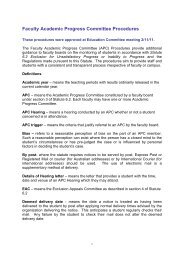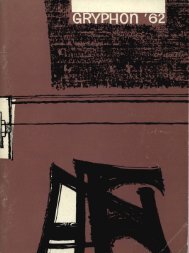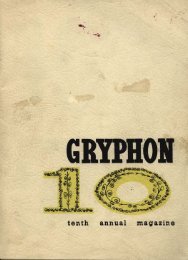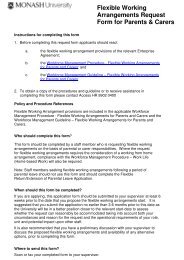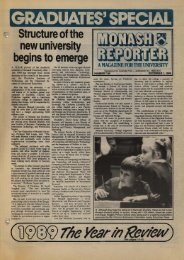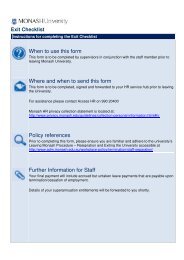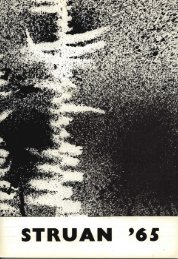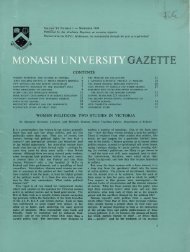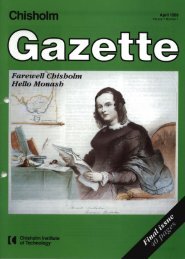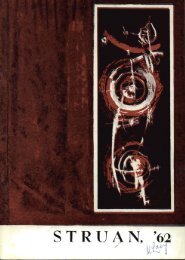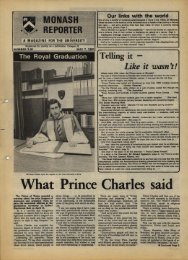GAZETTE - Adm.monash.edu.au - Monash University
GAZETTE - Adm.monash.edu.au - Monash University
GAZETTE - Adm.monash.edu.au - Monash University
- No tags were found...
You also want an ePaper? Increase the reach of your titles
YUMPU automatically turns print PDFs into web optimized ePapers that Google loves.
eading reference files has already yielded data of considerablevalue for this purpose. The system is, furthermore,currently undergoing expansion to permit the incorporationof communications terminals providingdirect access to the library's computer files at the <strong>University</strong>computer centre.Comparison of computer processes introduced so farin the student reading area with those existing before"computerization" indicates that there are marginal costeconomies. Where the computer systems appear to havea decided advantage, however, is in their capacity for aconsiderable increase in data intake and range of productswithout a consequent increase in cost in the samelinear relationship as earlier systems exhibited.No staff retrenchment is likely in the present context,but there are some grounds for hope that use of thecomputer in library process work will facilitate the provisionof services to meet the increasing demands beingmade on the library.From the student reading programme it was a shortstep to the development of a computer file of titles forperiodicals currently received. A previous edition ofthis list at <strong>Monash</strong> in 1964 utilized the comparativelyexpensive but very presentable Fatalist (Sequential)Camera technique. The regular presentation of this sortof documentation is always difficult, however, since thebasic file requires considerable staff attention and revisionfor each production cycle, and it was decidedthat the importance of this list, from the current awarenessviewpoint, coupled with the need for regular andrapid up-dating and economical listing sch<strong>edu</strong>les, madea computer application eminently desirable.This development must naturally be regarded as afirst measure only in the provision of machine accessto the control and entry of periodicals information.Using the <strong>University</strong> computer facilities, and those of theoffice services section, new editions of "periodicals currentlyreceived" can be processed and printed relativelycheaply, and the first such edition was distributed in thelatter part of 1967. As with student reading, the basicfile has been used for several special-purpose listings,including selections for French, German and mathematics,and is used regularly for the provision of informationnecessary for the management of libraryprocesses.A similar technique has been applied to the recordingof titles held in departmental libraries, many of whichdo not at present occur in the main catalogue. This listis an essential prerequisite to the establishment of aproper control mechanism for the cataloguing of thisconsiderable bulk of "unadvertised" material (over11,000 titles). Once again the adoption of this programmewas facilitated by the use of the short-titletechnique applied in the student reading programme. Theresult of the exercise has been for the first time consolidatedinformation about departmental collections relevantboth on the <strong>Monash</strong> campus and elsewhere (e.g.,city hospitals) which provides the necessary foundationfor a thorough examination of the relationship betweenthese holdings and those in main and branch librarieson the campus.The use of short title entries in the work describedabove has proved quite adequate for the purposes forwhich they were designed, but to suggest that this typeof entry can answer all the problems encountered inaccessioning, cataloguing and referencing library materialswould be a major over-simplification.The main project is and has always been the developmentof computer-readable catalogue entries. Whilethese can be produced locally, the commercial availabilityin punched paper tape form of catalogue entrieswhich resemble the products of another and larger computersystem (at the U.S. Library of Congress) hasraised the question of how many such records needactually to be made locally. It is, therefore, appropriatethat programmes should be developed to take advantageof this new source of information, and an exercise is nowbeing undertaken which is already yielding technicaldata (compiled through the good offices of four researchlibraries in Victoria) of a kind not previously availablein Australia.So far we have been concerned mainly with thetechnicalities of using computers as tools in cataloguingwork; we are now assessing the wider implications froma library systems viewpoint - the possibilities, for example,of extracting a substantial number of the basicrecords we need from a centrally supplied "data bank",and of <strong>au</strong>gmenting and enriching that supply to fit ourneeds, and possibly also those of some other libraries inthe Melbourne area. This amounts to a fresh experimentin central cataloguing: an idea often explored but seldomsuccessfully achieved. Recent analysis of the currentcollecting patterns in Victorian universities reveals arelatively low rate of duplication, in marked distinctionto the prevailing pattern in some American state universitiesfor example; and it has hitherto been generallyaccepted that without a large measure of simultaneity inseparate cataloguing processes centralization must beunprofitable. But current emphasis in Britain, the U.S.A.and Australia points to the re-emergence of some formof central cataloguing as a serious possibility, perhapsthe more so in the light of the new technology associatedwith computer utilization, and if this possibility isto be regarded seriously it must be examined in thelocal context.Australian libraries are increasingly involving themselveswith <strong>au</strong>tomation in various forms: some forty-fivesuch projects were listed in March 1967. Much work hasbeen done to formalize existing library proc<strong>edu</strong>res,which must be done before any computer systems areimplemented, and some fairly interesting computer processeshave been placed on a regular operational basis.Some programming and system analysis positions havebeen created in Australian libraries to relieve Iibrariansof the need to make outside arrangements for thissort of work. In concert with this trend, the acceptanceof data processing as an ingredient in professionaltraining for intending librarians is now winning officialrecognition. The whole development of applied computersystems in libraries must, to a large extent therefore,depend upon the integration and familiarization ofpersonnel with new ways, and the continued recognition ofthe importance of research in the field of library science.The impact of computers will affect not only the wayin which libraries conduct the business of collecting, registeringand displaying their material resources but alsothe whole library/patron relationship. It is important,therefore, to foster a "feedback" mechanism which willsupply libraries with much-needed information fromusers about their particular requirements of library ser15



